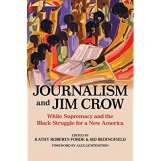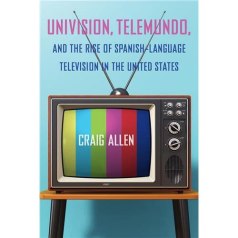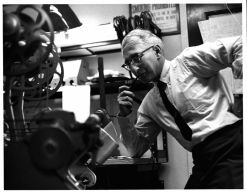Nominations are open for the Donald L. Shaw Senior Scholar Award. This History Division honor will recognize an individual for excellence in journalism history research who has a minimum 15-year academic career and a record of division membership. To apply, the nomination packet should include a cover letter that explains the nominee’s research contributions to journalism history, a CV, a brief biography, and a minimum of two letters of support. Self-nominations, with the accompanying supporting materials, are welcome. Letters may be addressed to Committee Chair Amber Roessner.If you have been nominated in the past two years, you do not need to reapply since your nomination remains in the pool. Email nominations to aejmchistory@gmail.com by 11:59 p.m. Central Time March 15.
Author Archives: Kathryn McGarr
A Word From the Chair

It’s hard to believe we are finally at the end of what has no doubt been a busy semester. I appreciate all of the hard work of our members and executive team this year, and look forward to the History Division events and conferences in 2022.
The first 2022 event is the AEJMC Southeast Colloquium, held March 17th-19th as a hybrid event at the University of Memphis. The paper, panel, and research in progress deadline for the Southeast Colloquium is fast approaching on December 18, 2022 at 5 p.m. CT. More information about the conference can be found here.
A big thank you goes out to our Southeast Colloquium Division representative Dr. Scott Morton (Catawba College). If you have an interest in reviewing papers or serving as a moderator/discussant at the conference, please contact Dr. Morton at smorton17@catawba.edu. This conference is a great opportunity for graduate students and early career faculty. Remember that submissions accepted for presentation at the Southeast Colloquium can also be submitted to the AEJMC 2022 annual convention in Detroit.
As I mentioned last month, we also appreciate the numerous panel submissions we received for AEJMC 2022. Our division’s Vice Chair Dr. Maddie Liseblad (Cal.State-Long Beach) will send those notices out by January 2022.
This month’s CLIO showcases the ongoing work of our members, and also includes a call for an upcoming essay series in American Journalism. As this is the last CLIO of 2021, I want to thank everyone for their help in making the History Division a standout within AEJMC, and wish everyone a happy end of the semester, holiday, and New Year.
– Cayce Myers
Member News: Matthew C. Ehrlich, Will Mari, Elisabeth Fondren, Joe Campbell

Matthew C. Ehrlich, an emeritus professor of journalism at the University of Illinois at Urbana-Champaign, has a new book, Dangerous Ideas on Campus: Sex, Conspiracy, and Academic Freedom in the Age of JFK (University of Illinois Press). The book focuses on two academic freedom cases at the University of Illinois: a biology professor fired in 1960 after he condoned premarital sex, and a classics professor not fired in 1964 after he claimed that the recently assassinated John F. Kennedy was a loathsome traitor. The book places those two cases in the context of the culture wars of the time and shows how the cases continue to resonate in today’s polarized political climate. The book also highlights the distinction between academic freedom and free speech, as well as the important role of student news media in promoting the open exchange of ideas.

Will Mari, an assistant professor at Louisiana State University, has a forthcoming book, Newsrooms and the Disruption of the Internet: A Short History of Disruptive Technologies, 1990-2010 (Routledge, February 2022). It explores how the internet impacted the journalism industry in the 1990s and 2000s and is a sequel to A Short History of Disruptive Journalism Technologies, 1960-1990 (Routledge, 2019), which explored the computerization of the newsroom during the Cold War. (Contact Will for a digital copy of the latter.)

Elisabeth Fondren, an assistant professor at St. John’s University, published “Fighting an Armed Doctrine: The Struggle to Modernize German Propaganda during World War I (1914-1918)” in Journalism & Communication Monographs. Her article chronicles the ideas and methods of early German propagandists, including their secret attempts to copy ideas from their enemies, and how World War I conspiracy theories and publicity lessons carried over to World War II and informed Nazi propaganda. Michael S. Sweeney, Ross F. Collins, and Sarah Oates wrote expert commentaries. In October, Elisabeth was invited to speak at Yale University about her research on archiving media, memory, and propaganda history.

A class lecture by Joe Campbell, a professor at American University, about the media myths of the Washington Post and Watergate was taped by C-SPAN in November and is to be shown in 2022 on the cable network’s “Lectures in History” series. C-SPAN previously has aired Joe’s lectures about the myths of yellow journalism and the Spanish-American War and of the “Cronkite Moment” of 1968. Joe, a former History Division chair, is in his 25th year at American.
Member Spotlight: Ashley Walter

Where you are currently getting your Ph.D.: Penn State University
What brought you into grad school for journalism: I knew I wanted to be a professor while sitting in a media law class during my undergraduate. But, it was important for me to work first. I worked for an alt-weekly, and after a handful of years, I knew it was time for grad school. Luckily for me, in my master’s program, I was randomly paired to work with Pamela Walck, who opened up the journalism history world to me.
Why journalism history: My journalism history origin story starts with historical fiction. As a young girl, I loved the Dear America book series, which looked at a historical event through the eyes of a fictitious young girl. I still love historical fiction, but, as the saying goes, I’ve found that real life is even stranger than fiction. I love finding new stories and figuring out how to tell that story best.
Current research project: I am finishing my dissertation, which looks at sex discrimination class-action lawsuits at press organizations during the 1970s. After the 1964 Civil Rights Act banned sex discrimination, women working at U.S. magazines, newspapers, and wire services sued for equal rights in contentious decades-long battles. It is a project rooted in oral history and sheds light on modern-day inequities inside U.S. newsrooms.
Fun fact about yourself: I love folk music, and I play guitar and sing. I am most attracted to narrative folksongs and have written a few songs based on stories I’ve dug up while researching.
Call for papers, panels, and abstracts by Dec. 18 for the hybrid AEJMC Southeast Colloquium (March 17-19, 2022)
The 47th annual AEJMC Southeast Colloquium, scheduled for March 17-19, 2022, will take place as a hybrid event. You are welcome to join us at University of Memphis or via Zoom.

Do you have some research in progress you would like to workshop? A paper ready to roll? What about a panel idea that is so current you can’t wait to make it happen? You don’t have to wait until Detroit. Authors are invited to submit their work for the 47th annual AEJMC Southeast Colloquium, March 17 -19, 2022, at the University of Memphis and online.
Planned as a hybrid conference, submitters will have the option to present in person or online. Panels will be conducted in person and shared on the conference platform.
Six AEJMC divisions will participate in the annual event: Electronic News, History, Law and Policy, Magazine Media, Newspaper and Online News, and Visual Communication. And there is an Open division as well, so everyone is welcome to participate.
In addition to the research competition, the conference will host a session about academic citizenship to help graduate students and early-career scholars learn some of the skills of presenting at a conference, reviewing research, and networking. We’ll also have a session with Great Ideas For Teaching presentations.
Come to the home of blues and birthplace of rock ‘n’ roll! You will be just in time for the start of spring, so, you can drink iced tea and eat Memphis barbecue while enjoying the warm spring Southern breeze, live music on Beale Street, the National Civil Rights Museum, Graceland, Sun Studios, Stax Records, the Rock and Soul Museum, and maybe even see an Elvis or two.
Acceptance of papers to colloquium competitions does not prevent authors from submitting to AEJMC divisions for AEJMC’s annual conference in Detroit. Graduate students are especially encouraged to submit their work.
Click here for the paper call and additional info.
Journalism History Podcast Spotlight
Each month, Clio will highlight the latest episode of the Journalism History podcast and recommend a set of episodes from the archives. The podcasts — available on the website and through many podcast players — are excellent teaching tools, easy to add to your syllabi. Transcripts of each episode are available online.

In the latest episode, Professor Kathy Roberts Forde discusses her co-edited book, Journalism and Jim Crow: White Supremacy and the Black Struggle for a New America.
This month, we’re highlighting episodes about television.

Episode 91: Ratings Powerhouses Univision and Telemundo Author Craig Allen describes how Spanish-language television networks Univision and Telemundo became ratings powerhouses by programming a unique mix of news, soccer, telenovelas and variety shows.
Episode 78: The Commercialization of PBS Historian Camille Reyes charts the history of the Public Broadcasting Service as a platform for new ideas and information that has been haunted and hobbled by capitalism and cronyism.

Episode 49: The Made-for-Television Tunnel Escape Historian Mike Conway describes the controversial production of a 1962 NBC documentary that captured the digging of a tunnel beneath the Berlin Wall to sneak East Germans to the West.
And a special Christmas episode that first aired in 2019:
Episode 39: Yes, Virginia, There is a Santa Claus The hosts of the Journalism History podcast come together for a special Christmas episode that tells the story of an 8-year-old girl and the most reprinted editorial in the English language.
Call for Essays in American Journalism: The Future of Historic Research in Journalism & Mass Communication – abstracts due Dec. 31
American Journalism is soliciting submissions of abstracts for think-piece essays to run in special fortieth anniversary issues. We are soliciting original perspectives on the present and future of media history scholarship, written by graduate students and junior (non-tenured) faculty, as part of a broader celebration of the journal.
Submissions may explore a wide range of topics, including the present and future of historiographical frameworks and methodologies, trends in research, challenges facing the scholars of tomorrow, and vision-casting for the future of media history research. Possible essay topics include how particular frameworks or methods could become more popular or less common in coming decades, or how historical scholarship might be impacted by ongoing social and political movements and world events such as the COVID pandemic.
Scholars identifying with and/or researching historically marginalized populations are particularly encouraged to submit their work.
Submission packets should include:
1) an essay abstract of 600 to 800 words, submitted as .doc or .pdf; and
2) a two-page condensed CV that highlights publications, awards, and service roles that reflect the scholar’s contributions to the study of media history.
Digital abstract submissions should be sent to americanjournalismeditor@gmail.com by 11:59 p.m. December 31, 2021.
Submissions will be refereed by a panel of media historians who will judge entries based on the scholar’s standing in the field, the quality of their arguments, and their ability to present views about the past, present, and future of media history that reflect original thinking and promise to stand the test of time.
Selected authors will be invited to submit a full-length, 2,000- to 3,000-word essay for publication in one of a series of anniversary issues commencing in Winter 2023.
Deadline for Abstract Submissions: December 31, 2021
Announcement of Winning Proposals: January 15, 2022
Deadline for Full Essays: August 1, 2022
Expected Commencement of Publication: Winter 2023
For more information or questions about submissions and potential topics, please contact AJ editor Dr. Pamela E. Walck at walckp@duq.edu.
A Word From the Chair

In the History Division we have been hard at work putting together programming for the 2022 convention in Detroit. A big thank you to all of our members who submitted panel proposals for the upcoming national convention. Our Vice Chair Dr. Madeleine Liseblad (California State-Long Beach) is currently working on finalizing that programming with AEJMC, and those who submitted panels should hear back from the division in early 2022.
Members are what make the History Division such a strong unit within AEJMC. However, some of our members may not have received their membership renewal notifications this year. If you have not received your renewal notification, or are unsure of your membership status, please reach out to AEJMC membership directly.
There is a lot going on in History Division. Of particular note is Dr. Terri Finneman’s (Kansas) update on the new submission guidelines for Journalism History, which we believe will provide a greater opportunity for more submissions. As always, there’s exciting podcast recommendations, member news, and profiles.
Finally, many of our members mourn the loss of the legendary scholar-mentor-teacher Dr. Donald Shaw (North Carolina) who passed away on October 19, 2021. Dr. Bradley Hamm (Northwestern) has written a remembrance of Dr. Shaw and the significant role he played in the field of communication and, more importantly, his impact on his many students.
Once again, thank you to all of our members for your continued support of the division. If there is anything that the division leadership can assist with, please do not hesitate to contact us.
– Cayce Myers
Member News: Kathy Roberts Forde & Sid Bedingfield, Matthew Pressman, Owen Johnson

Journalism and Jim Crow: White Supremacy and the Black Struggle for a New America, a new book co-edited by Kathy Roberts Forde, a professor at the University of Massachusetts Amherst, and Sid Bedingfield, an associate professor at the University of Minnesota, appears in November. White publishers and editors used their newspapers to build, nurture, and protect white supremacy across the South in the decades after the Civil War. At the same time, a vibrant Black press fought to disrupt these efforts and force the United States to live up to its democratic ideals. Journalism and Jim Crow centers the press as a crucial political actor shaping the rise of the Jim Crow South.

Matthew Pressman is co-editing a volume tentatively titled The Saturday Evening Post Goes to War, examining the history of the magazine’s coverage of conflict. Please view the complete CFP here and consider submitting a proposal or sharing with others. Proposals are due February 14, 2022. Email matthew.pressman@shu.edu with any questions!

Owen Johnson, an associate professor emeritus at Indiana University, will be participating in two events in November: a panel on World War II correspondents with Ray Boomhower of the Indiana Historical Society on November 6 at the Ernie Pyle World War II Museum in Dana, Ind.; and a 75th anniversary Zoom celebration of the Faculty of Journalism at Moscow State University on November 18 on Zoom.
Remembrance of Donald Shaw, by Bradley J. Hamm

In his heart, Donald Shaw was a historian.
He was known worldwide as co-author of the original Agenda Setting studies. The 1972 article combined journalism, political communication and public opinion research and created perhaps the greatest of the “milestone” communications studies of our lifetime.
Yet Shaw’s focus in the 1960s was an influential study on news bias and the telegraph. He lived intellectually across research fields, a lesson for us all. Years later, he delivered an influential talk on “The Rise and Fall of American Mass Media,” which predicted media fragmentation today based on historical trends. He published on journalism and military history, plus agenda setting, into his 80s.
Shaw died October 19, 2021, after a brief illness.
I met with Shaw at least weekly in Chapel Hill over the past several years. He was my PhD mentor, and we formed a long friendship. A lunch conversation with him could jump across centuries and disciplines, yet he always came back to two core topics: family and research. In our last time together, he was going strong — planning for the 50th anniversary of Agenda Setting, discussing an update of “Rise and Fall,” and excited about the issues of today.
Shaw was unique. His history, particularly his impact, can be told through the stories of the many people he met, mentored and loved.
Fittingly, the top award given at AEJMC in Shaw’s name is in the history division and recognizes lifetime achievement. His traditional academic home remains where he started sixty years ago as a young student at Wisconsin — in journalism and media history.
– Bradley J. Hamm
Donations to the Shaw Senior Scholar Award may be made to AEJMC.
